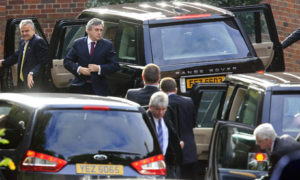Il primo ministro Peter Robinson dice che il trasferimento dei poteri su giustizia e sicurezza difficilmente avverranno prima di Natale

Il primo ministro Peter Robinson ed i suoi colleghi parlamentari del DUP anno avuto incontri con Brown all’ora di pranzo. Ma Robinson non vede alcuna prospettiva di una svolta dopo la riunione con il primo ministro.
Parlando dopo l’incontro del partito con Gordon Brown, il primo ministro ha detto: “Siamo rilassati, siamo concentrati sugli argomenti, non ci gettiamo nella corsa per il posto, ci assicureremo che le cose siano a posto per quanto riguarda la polizia e la giustizia”.
Subito dopo Brown ha avuto una discussione insieme a Robinson e al vice primo ministro Martin McGuinness, Sinn Fein. I parlamentari di DUP e Sinn Fein sono stati coinvolti in rancorosi scambi d’opinione sul trasferimento dei poteri a Stormont.
Per McGuinness il DUP sta lavorando con la paura di perdere voti a favore del Traditional Unionist Voice e si muovi con i piedi di piombo sul trasferimento dei poteri su sicurezza e giustizia a Stormont. Robinson a descritto gli ultimi commenti di McGuinness sull’attitudine del DUP verso il trasferimento come “un disgustoso attacco unilaterale”.
Il leader del DUP ha predetto che l’atto conclusivo della devolution non sarà possibile fino a dopo Natale. Il primo ministro ha detto che non acconsentirà al trasferimento fino a quando l’Esecutivo nordirlandese non avrà il controllo sull’intero budget per far funzionare il sistema di polizia e sicurezza.
Durante la sua visita Brown ha parlato anche con il nuovo comandante della Police Service of Northern Ireland, Matt Baggott, sulla situazione della sicurezza, in particolare sulla minaccia proveniente dai repubblicani.
Ci sono molte preoccupazioni secondo cui i continui litigi tra i due più grandi partiti repubblicani possano causare il crollo del governo condiviso in Irlanda del Nord.
Tratto da Guardian
DUP refuses to rush devolution after Belfast talks with Gordon Brown
First minister Peter Robinson says transfer of policing and justice powers to Stormont unlikely before Christmas
The first minister, Peter Robinson, and his Democratic Unionist party assembly members held discussions with the prime minister at lunchtime. But Robinson held out no prospect of a breakthrough following the talks convened by the prime minister.
Speaking after his party’s meeting with Gordon Brown, the first minister said: “We are relaxed, we are going to stay focused on the issues, we are not going to rush and make a dash for the post, we will make sure things are right on policing and justice.”
Later the prime minister will hold joint discussions with Robinson and the deputy first minister, Martin McGuinness, of Sinn Féin. The DUP and Sinn Féin assembly members have been involved in rancorous exchanges over the issue of policing and justice coming under Stormont’s control.
McGuinness claims the DUP is running scared of the hardline Traditional Unionist Voice party and is dragging its feet over moves towards transferring justice and policing powers to Belfast. Robinson described McGuinness’s recent comments on the DUP’s attitude to devolving those powers as a “nasty one-sided attack”.
The DUP leader predicted that the final act of devolution would not be possible until after Christmas. The first minister said he would not agree to the transfer until the Northern Ireland executive gets the full budget for running the police and the judicial system.
During his visit Brown will also be briefed by the Police Service of Northern Ireland chief constable, Matt Baggott, on the security situation, particularly the threat posed by republican dissidents.
There are fears that the increasingly bitter row between the two largest parties could bring down the power-sharing executive.